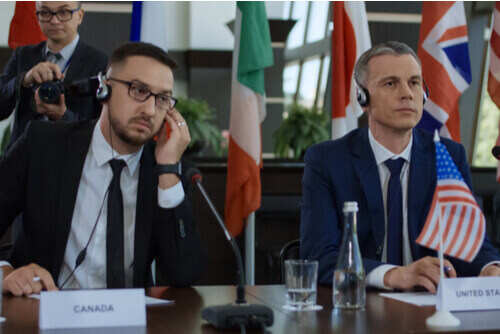
Are you looking for interpreters in Berlin? Our interpreting services will let you communicate effortlessly. Whether you are organising a business meeting or an event, closing a deal or taking your employees for a tour, we ensure that language is not a barrier. Rely on our experts to achieve your goal and choose us for all your interpreting needs in the city.
We offer simultaneous interpretation, consecutive interpretation, telephone interpreting and video interpreting. We have got you covered for all situations.
The success of your specialist congresses, conferences and international summits depends on simultaneous interpreters. They translate spoken content in real time, without pauses. Their skill keeps every participant on the same page during your meeting.
Are you organising an international business meeting, interview, or cultural event where two or three languages will be used? Do not forget to hire a consecutive interpreter. They listen to your speakers and make sure the audience understands them.
Do you need to quickly clarify important issues with your international partners? Telephone interpreting is a cost-effective solution that can be done in no time, all over the world.
Are you organising an online meeting? Video interpreting is what you need. The participants connect instantly through a digital platform and get all the information in their language. Video interpreting is our answer to fast-developing technology.
Are you looking for an interpreter in Berlin? Talk to us! Our contact person at Skrivanek will help you find the perfect interpreter for your needs.
We are a translation agency providing specialised interpreting services in the Berlin area. We have a team of certified interpreters who are familiar with a wide range of subjects. Whether you need a translation for a conference, meeting, trade fair or any other event, we can match you with a specialist who will help you with language barriers.
WHO IS AN INTERPRETER?
An interpreter changes spoken or sign language into another language. This can happen in real-time or as a recording. He needs to know both languages well and be able to discuss different subjects, also involving specialist terminology. The interpreters should be good listeners, remember things well, and stay calm under time and social pressure.
Interpreters work in many places: small and big meetings, courts, hospitals, and conferences. They make sure their translation is always accurate, maintaining the style of the original message. Good interpreters think on their feet and handle changes well.
In today’s fast-paced world, there is a rising need for experienced interpreters. More people travel and do business across countries, so quick and correct translations are required for achieving the right level of success. Moreover, interpreting services are now also available online and by phone, making it easier than ever to connect with people from different parts of the world.
A GOOD INTERPRETER: SKILLS
You should have high expectations for the quality of the interpretation you receive. Only an interpreter who is fluent in both languages can help you with the task. If you seek translation during a meeting where specialist terminology is used, you require a professional who has an in-depth understanding of the subject.
A professional interpreter always remains neutral. His task is to convey information free of personal bias. He should be attentive and responsive, proactively clarifying any doubts. When you work with a professional interpreter from a reputable agency, like Skrivanek, you can be confident that these standards will be met.
TYPES OF INTERPRETING
Interpreting can typically be divided into 3 different types: simultaneous interpretation, consecutive interpretation, and sight interpreting.
SIMULTANEOUS INTERPRETATION
In simultaneous interpreting, the interpreter listens to the source language through headphones and speaks almost at the same time. This is often used in large multilingual meetings, such as United Nations conferences, with speakers of many foreign languages who do not share a common language. Simultaneous interpretation typically requires specialised equipment, such as soundproof booths, headsets, and microphones. It is sometimes also known as conference interpreting.
CONSECUTIVE INTERPRETATION
In consecutive interpretation, the speaker stops after a sentence or a couple of seconds of talking in the preferred language. The interpreter repeats what was said in the other language. He relies on his memory and note-taking. This service is common in one-on-one meetings or interviews. Occasionally, it takes a form of whispered interpretation when only one person needs translation.
SIGHT INTERPRETING SERVICES
Sight interpreting is slightly different from the previous two. The interpreter reads a document in one language and immediately speaks it out loud in the target language.
Which one of the interpretation services is most appropriate for a particular situation depends on several factors, such as the subject, the setting, and the groups’ necessities.


WHY WORK WITH AN INTERPRETER?
Contracting an interpreter has many benefits, as a professional has to ensure that everyone understands clearly. This helps to minimise potential mistakes that could result in costly problems. An interpreter also helps in saving time: he knows how to work with 2 languages and does so quickly and efficiently. You do not need to explain things multiple times, use Google Translator, or rely on your employees, who might not have enough experience in interpreting.
Having an expert interpreter can allow two groups to trust each other more. In a world where almost every country is connected, understanding different cultures matters. A small miss-step could offend your contractor and ruin months of preparation. Professional interpreters provide invaluable expertise in this matter. If you want to build long-lasting relationships, then do not underestimate their services.
TECHNOLOGY IN INTERPRETING
Technology has revolutionised the interpreting industry, with new solutions helping professionals to perform better. The use of Voice over Internet Protocol (VoIP) has even enabled interpreters to work remotely. The quality of platforms like Teams, Skype or Zoom allows for accurate translations from every place in the world. As the interpreter does not need to be physically present, it even allows for communication in lesser-known languages.
Technology has also improved language access for people with hearing disabilities. It can also facilitate communication between signed and spoken language.
INTERPRETING FOR ALL INDUSTRIES
An interpreter translating for a medical conference has a slightly different vocabulary knowledge than a person working on an international summit. Only a professional with experience in a given field is able to convey the meaning of a speech quickly and accurately.
In Skrivanek, we are proud to provide services to various industries, including healthcare, financial services, insurance, marketing and automotive. All our interpreters are trained to provide the highest level of translation. If you need help communicating with a foreign client, then our translation agency is here to help.
Contact us via email or contact form to learn more about our interpreting services. We can tell you how we will help you to communicate.
DIFFERENCES BETWEEN INTERPRETING AND TRANSLATING
Although the terms ‘interpreter’ and ‘translator’ are often used interchangeably, their work is very different. Interpreting and translating both deal with changing one language into another; however, it all depends on the context.
Interpreting is about changing spoken words from one language to another, such as what happens during meetings or conferences. Translating is about changing written words from one language to another, and might involve books, documents, or video subtitles. In short, interpreting is used for spoken words while translating relates to written words.
INTERPRETERS VS TRANSLATORS
Qualified interpreters must be able to think and process information quickly to provide an accurate interpretation. They need to have a strong understanding of both cultures as well as good people skills. Translators, on the other hand, take more time to produce a well-written translation. However, they need a good eye for detail and amazing knowledge of the punctuation rules used in the different languages.
Both oral and written forms facilitate effective communication between the speakers of different languages. Understanding the difference enables you to choose the right expert for your task.
INTERPRETATION SERVICES IN SKRIVANEK
Are you looking for reliable interpretation services that are tailored to your needs? Look no further! At our translation agency, we work with over 100 language pairs. We offer support for the medical sector, automotive industry, marketing and many more fields. We have helped companies during business negotiations, international conferences, and one-to-one meetings.
Our industry knowledge ensures your message will get translated without alterations. By partnering with us, you can solve all your communication problems. Contact us today, so we can find the right solution for you.
WHAT OUR CUSTOMERS SAY ABOUT US
Vielen Dank für Ihre qualifizierten Übersetzungen und die hervorragende Kundenbetreuung.
Herzlichen Dank für die sehr gute und nette Zusammenarbeit!
Ich empfinde die Zusammenarbeit mit Skrivanek als höchst angenehm. Skrivanek reagiert immer vorbildlich!
Rasch, zuverlässig, kunden- und lösungsorientiert, sehr engagiert. Wir schätzen die Zusammenarbeit mit Skrivanek sehr.
Vielen Dank für die perfekte Unterstützung & tolle Zusammenarbeit in den vergangenen Jahren! Wir freuen uns auf die kommenden Jahre… weiter so!
Super schnelle Bearbeitung und immer bestens informiert!
Alles Bestens, entsprechend erhalten Sie von uns auch viele Aufträge!
Sehr schnelle Reaktionszeit, klare Fristen und deren Einhaltung.
NEARLY 30 YEARS OF EXPERIENCE!
We provide professional translations that meet the highest quality standards.
100+
language combinations in portfolio
100%
of our clients would recommend us
50+
fields of expertise




